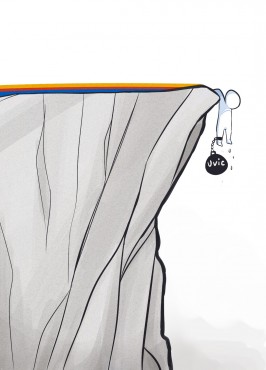There’s been a lot of discussion recently about UVic’s sexual assault policy (or rather, their lack thereof), and rightfully so. From the assault that occurred on campus last September, to the home invasion that occurred near the university last month, to the recent arrest of a student on four counts of sexual assault (just to name a few incidents), it would seem that now is the most pressing time for UVic and the provincial government to address this epidemic on university campuses.
In the aftermath of these aforementioned assaults, the administration responded by putting up notices and posting bulletins advising students to report to campus security. UVic has previously argued that campus security could act as a referral service and direct students to other centres on campus where they can access the support they need. This is an exceptionally shortsighted move by UVic administration, as the fact remains that security personnel are not trained counsellors or support workers, never mind that pressure to report can actually drive survivors away from accessing services.
The frameworks that dictate the administration’s response are antiquated and cause more harm than good, and any insistence from the university that the policies in place are working are wrong at worst, and misleading at best. However, this insistence insidiously benefits UVic’s administration — without a comprehensive framework that properly dictates the tracking and reporting of assaults on campus, there doesn’t have to be a real acknowledgement that it’s happening here. Furthermore, if a student accesses health services or counselling services after they’ve been assaulted, then it becomes an individualized issue rather than a reflection of a systemic problem. No university wants to be seen as an institution that is unsafe, despite the fact that administrations actually make their campus a more dangerous place to be by ignoring the problem.
With the introduction of Green Party MLA Andrew Weaver’s new bill, the Post-Secondary Sexual Violence Policies Act, the conversation is slowly moving in the right direction, but there still needs to be a frank admittance from the university that the problem exists. A sexual assault policy, while a good place to start, is not the only solution, and should be part of a comprehensive framework that attempts to dismantle rape culture while also offering support for survivors. It starts with an honest assessment of the number of students dealing with issues of sexualized violence — keeping in mind that most people who are sexually assaulted don’t report — and it continues by sitting down and listening to the people who have actually been affected by this issue.
At the end of the day, this is about students getting hurt, and a whole lot of people letting it happen. Sexual violence is intolerable, and it’s something that we can end if we’d just bother to acknowledge it. We should not be leaving survivors to come forward and fight for this change themselves. What we need is for the university to recognize that sexual violence is a problem on this campus, and to introduce the resources to fight it. After all, the pursuit of education is a right in this country, and there is no reason why bodily rights should be subsumed in that pursuit.







